- Home
- Robin Hobb
Forest Mage ss-2 Page 11
Forest Mage ss-2 Read online
Page 11
Rosse and Cecile had chosen a simple ritual for their ceremony. The day was beginning to warm, and I’m sure I was not the only guest who was grateful that we would not be required to stand in witness for too long.
Their fathers exchanged pledges of friendship and loyalty first, and then their mothers exchanged vows to comfort, help, and refrain from gossip. I stood stoically through them. But when Cecile and Rosse made their pledges of loyalty, trust, and mutual faithfulness, my throat constricted and tears pricked my eyes. I do not know if I wanted to weep because Carsina had betrayed our fledgling love or for my scratched pride. This moment with Carsina should have been mine, I thought fiercely. It should have been a memory that we would cherish through our years together. Instead, I would have to remember always that she had forsaken me at this moment. I set my teeth and forced my lips into a rubbery smile, and when I wiped a tear from my eye, I told myself that everyone who observed it would think it was a tear of joy at my brother’s good fortune.
Rosse and Cecile shared the tiny cake of bitter herbs followed by the more generous honey cake that represented the bad and the good times that they would share. Then they turned from the altar and lifted their joined hands. The gathered witnesses erupted with cries of joy and congratulations and the musicians on the dais awoke their instruments. As lively and celebratory music filled the ballroom, the guests cleared the floor and formed a circle for Cecile and Rosse. My brother had never been a graceful dancer, so he must have practiced quite a bit to perform as well as he did. Not once did he step on Cecile’s trailing blue train. At the end of the dance, he swept her up in his arms and spun around and around as he held her, making her sleeves and train fly out around them, much to the delight of the onlookers. A single misstep would have sent bride and groom tumbling to the floor, but he managed to set his giddy bride squarely on her feet. Flushed and laughing, they bowed to their audience.
Then came the most important part of the ceremony, not just for Rosse and Cecile but for both families as well. My father and Lord Poronte broke the seals on the congratulatory scrolls that had come from King Troven. As all the gathered folk expected, the scrolls contained a substantial land grant to each family to “celebrate the joyous union of two of my most loyal noble families, and with fond wishes that both your houses will continue to flourish.” The land allotted to the Burvelle holdings increased our holdings by a third. The satisfaction on my father’s face shone. I could almost see him totting up how much additional acreage the king would gift him as each of his other four children married. I suddenly realized that this was how King Troven encouraged alliances between the new noble houses, thus keeping their loyalty safely in his pocket.
“Please join us in dancing and feasting!” Cecile invited her guests, and to a loud burst of applause, all did just that. The doors to the adjacent dining room were opened wide, to reveal long tables. I was not near the doors, yet I was abruptly aware of the savory aromas of the fresh breads and roasted meats and sweet fruit tarts. A wedding in our part of the country was an all-day celebration. When one traveled long distances for such an event, the host endeavored to make it memorable. The talk and dancing and eating would continue all day at the Porontes’ home. Servants would be kept busy constantly replenishing the tables. Many of the guests would spend the night with the Porontes, and then join us at our home tomorrow for a second day of socializing and feasting. At one time, I had anticipated a merry occasion, and had planned several opportunities to be alone with Carsina. I had even imagined stealing a kiss or two. Now I dreaded several days of torment. My stomach growled at me urgently. I listened to it in horror, as if a monster had taken up residence in my flesh and demanded sustenance. I tried to tell myself that I was too saddened to be hungry, but my belly asserted otherwise. The sight of Kase Remwar leading Carsina to the dance floor only reinforced the emptiness I felt. I was famished, I discovered, and trembling with hunger. Never before had my sense of smell seemed so keen. From where I stood, I could tell that the prairie fowl had been roasted with sage and onion, and that the lamb had been prepared Plainsman-fashion, rubbed with wild celery root and cooked in a pot with a tight lid. I thought it the limit of my self-control that I walked around the edge of the dance floor rather than elbowing my way through the dancers to reach the food.
Halfway around the room, I encountered my father talking to Carsina’s father. Lord Grenalter was laughing at something my father had just said. They both seemed very jovial and convivial. I’d intended to slip past them unacknowledged. But as Grenalter drew breath from laughing, our eyes met. Courtesy forced me to greet him. I stopped, bowed to him, and then, as I advanced, he said, quite loudly, “Good god’s breath, Burvelle! Is that Nevare?”
“I’m afraid so,” my father said levelly. His look told me I was a fool for having called attention to myself. He forced a grin to his face. “I think the academy doctor went too far in putting flesh back on him after the plague. He’ll soon have it off, if I have anything so say about it.”
And what could I do, save grin shamefacedly and agree? “Very soon, sir,” I assured him. And then, lying through my teeth, I added, “The doctor told me that a temporary weight gain like this is not unknown among plague survivors. He told me that I should be grateful to have gone this way, rather than lost flesh and stamina.”
“Well…I’m sure the doctor would know what he is talking about. Still. It is a startling change, Nevare, as I’m sure you know.” Lord Grenalter seemed determined to make me admit that the transformation was horrifying.
“Yes, sir, it is that. Thankfully, as I’ve said, it is temporary.”
“Well. I suppose we should thank the good god for your health, and never mind the rest for now.”
“Yes, sir. I do that every morning when I awaken alive. It’s not a thing a man takes for granted, once he has experienced the plague.”
“Was it very bad, then, in the city?”
And I was pathetically grateful to horrify the poor man with a lurid telling of just how bad it had been. When I spoke of the dead stacked like cordwood on the snowy grounds, I realized that even my father was listening to me. So I deliberately told, with genuine sorrow, of my fellows whose health had broken so badly that they would never soldier at all, let alone continue a career at the academy. I finished with, “And so, of course, ungainly as I find myself at present, you can understand why I am grateful to have come through the experience with my future intact. And with Colonel Rebin in charge of the academy once more, I anticipate continuing my studies with more pleasure than ever.”
“A remarkable tale! And did they ever find what wayward son of a dog brought plague to Old Thares?” Carsina’s father was completely in thrall to my tale now.
I shook my head. “It is suspected that it came to the city with some Specks who were being displayed at a Dark Evening carnival.”
“What?” Horrified, he turned to my father. “Had you heard of Specks being allowed to travel to the west?”
“It was inevitable that someone would try to smuggle some to the city eventually,” my father said with great resignation. “The greatest folly was that one of them was a female. From correspondence I’ve had with authorities at the academy, she was the likely source of the plague.”
“No!” Carsina’s father was aghast. He turned to me, and suddenly a new light kindled in his eyes, as if he had suddenly worked an equation and was appalled at the answer. His eyes appraised me warily. How had I contracted the dread disease? The question was in his gaze if not on his lips, and I answered it directly.
“There are other ways of transmission beside sexual contact,” I hastily insisted. “I’ve been working with Dr. Amicas at the academy, simply because of the unique aspects of my case. Some of my fellows, I will admit, fell to the plague after having congress with a Speck whore. I, sir, was not one of them. Nor, for example, was the young son of the former Academy commander. And of course, my own girl-cousin Epiny was also a victim of the plague.”
“And did she die?” I suddenly realized that the circle of my audience had grown. This query came from another listener, a middle-aged woman unwisely dressed in a virulent pink gown.
“No, ma’am, I’m happy to say she did not. Her case was very mild and she recovered with no side effects. Unfortunately, that was not true for the young new noble cadet she married. Cadet Kester was forced to withdraw from the academy. He is determined that he will recover his health sufficiently to return, but many feel that his military career is over.”
Several of my listeners now spoke at once.
“I served with Kester! It must be his son. That’s a damnable shame! Who else fell to the plague, from the new noble ranks?”
“What saved your cousin from the plague? What herbs did she take? My Dorota is with her husband at Gettys. She and her two little ones. They haven’t had it in the household yet, but she fears it’s just a matter of time!” There was great worry in that matron’s voice as she pushed closer to me.
But the voice I heard most clearly was that of Carsina’s father. Grenalter said slowly to my father, “Epiny Burvelle—that would be your brother’s elder daughter. She married a new noble soldier son who’ll have no career? Surely you told me that your brother planned to marry her to an old noble heir son?”
My father attempted a tolerant laugh. That was when I knew I’d said too much. “Well, you know young people today, Grenalter, especially the city-bred ones. They have small respect for the plans of their parents. And in a time of plague, permissions are given that ordinarily would be refused. Just as soldiers facing battle will sometimes commit acts that they would otherwise recognize as foolhardy.”
“Foolhardy. Indeed. I’ve witnessed a few acts like that,” Grenalter conceded heavily. I could tell he was distracted, and I could almost see him totting up and subtracting the advantages and disadvantages of his marital agreement with our family as if he were an accountant. Suddenly Epiny’s words about being sold as a bride to the highest bidder didn’t seem so melodramatic. Obviously, my weight gain was a debit to the transaction, but an even larger one was that the branch of the Burvelle family in Old Thares had not sold off their daughter to an old nobility family. Did connections and marriages actually carry that much political and social weight, I wondered, and then instantly knew that they did.
“Well?” demanded the woman anxiously, and my mind leapt back to her question.
“Lots of water and rest were the chief treatment, I’m afraid. I wish I could tell you something more specific. Dr. Amicas is making the prevention of the plague his specific area of study. He’s a very dedicated man. If anyone can come up with solid recommendation to protect families from transmission, it will be him.”
“And which other new nobles perished?” the other man demanded. I recognized him but could not call up his name. He was not a new noble, but was a very successful ranker who had followed Grenalter into retirement much as my father’s men had congregated around him. I suddenly realized that men like him would be pinning their hopes on the rise of the new noble class. Old nobles and heir sons would have little respect for a ranker like him. The new nobles who had directly commanded him recognized his worth. And if they came to power, that recognition might extend to his own soldier sons.
So I recited reluctantly the names of those new noble sons who had died from the plague, and those whose health had been badly compromised. When I mentioned that Trist Wissom had lost his health, I was surprised at the collective sigh of sympathy. And I was shocked when I recounted the names of those who had recovered well, and people exchanged glad glances when they heard that Rory and Gord were unscathed. They did not know my fellow cadets, but they knew or had known of their fathers. There was a sense of connection there. The old nobles were right to fear our rise to influence. The real power lay not in the new nobles and their sons who would follow wherever the king led, but in the ranks of the military who felt loyalty and alliance to the new nobles.
“Damn shame what’s happened to our academy. Damn shame!” This from the ever-excitable Lord Blair, a little bald man who always bounced on his toes when he spoke. “We needed those young officers, what with the rumors of trouble on the border near Rely. Looks like we might start up with Landsing all over again! You’d be sorry to miss out on that, wouldn’t you, Cadet? Fast promotions wherever the fighting’s thick, as I’m sure you know.”
I was at a loss. I hadn’t heard we were skirmishing with Landsing again.
“Gettys is where the real opportunity is!” This from a man I didn’t recognize. “The King’s Road has been at a standstill for damn near two years. Farleyton went out there to replace Brede’s regiment, but from what I hear, they’ve not done well. Same problems Brede had. Disease, desertion, and dereliction of duty! The king won’t stand for it anymore. I hear he’s sending Cayton’s horse and Doril’s foot to reinforce them. I feel sorry for Farleyton. They were a top-notch regiment not too many years ago. Some say that Gettys will just do that to a regiment. Disease breaks down the morale and destroys the chain of command. Haren’s got the command now. A good enough man for a second, but I’m not sure he’s up to ramrodding an operation like the King’s Road.”
“Colonel Haren’s a good officer!” someone else broke in sharply. “Careful what you say about him, man. I served beside him at the Battle of Dell.”
“Gentlemen, gentlemen! Now is not the time for war stories.” My father quickly broke in on the lively conversation. “Nevare, I am sure we are all grateful for the information you have shared with us, but let us not forget that we are here to celebrate a wedding! Surely some of you would rather be on the dance floor than listening to tales of disease and death? Or is there so little hardship in our life that we are drawn to such stories?”
He gained a general laugh with that gently bitter question. It was, indeed, part of our common lot that life was harder here on the edges of civilization.
“Let us celebrate life while we can!” one of the men suggested. “Death and disease will always be waiting for us.” And with that dark toast, my audience began to fragment. Some moved toward the musicians and dancing, others toward the tables of food. Grenalter himself left rather hastily. I surreptitiously tracked his flight and saw him join his wife and Carsina at a refreshment table. I saw him send Carsina off to join a group of other young women, and then take his wife’s arm and escort her to a quieter corner. I suspected I knew the topic of conversation. Without intending it, I sought for Kase Remwar, and found him dancing with my sister. She looked blissful. Remwar, an heir son, had been the Grenalters’ first choice as a match for Carsina. Had I just gossiped away my marriage arrangement? And if I had, had I dashed Yaril’s dreams as well? I felt queasy.
My father was not consoling. “You should talk less and listen more, Nevare. I will say no more on that topic now, but suggest that for the rest of the day, you become a very good nodder and listener. Keep your tongue from wagging. Why you saw fit to share such here information that you had not previously divulged to me, I shall never know. For the rest of this day, if you must speak, speak only of your brother’s happiness and good fortune. If you must speak of gloom, deplore the dry weather we’ve had!”
With that admonition, he left my side, striding away as if I’d insulted him. Perhaps by his lights, I had. He never liked to be second to know anything. I seethed. It was his own fault. If he had given me a chance to talk to him since my return, he would have known all my news and could have advised me what not to repeat. He had treated me unjustly, but worse, I had foolishly blathered out my tidings without considering if it was wise to do so. I already regretted my lie about what Dr. Amicas had said. I felt sure it was true, but I wished I had not quoted the doctor to give greater authority to my belief. The lie shamed me.
That bleakness of spirit suddenly quenched my hunger. I abruptly felt that selecting the food and taking it to a table and making small talk with my fellow guests would require more energy that I could summon. I glanced back at the
dance floor. The musicians still played, and Carsina was dancing with a young man I didn’t recognize. He was short, freckled, and didn’t dance well, but he wasn’t fat. I stood rooted, watching them and trying not to watch them. I saw her laugh at something he said. A perverse part of me dared me to stay in the room and ask her for the next dance. Her certain refusal would end my hope and put me out of my misery.
I loitered there, at the edge of the crowd, building my courage, denouncing it as foolhardy, rebuilding it, deciding that she was promised to me and it was my right to speak to her, losing my courage again…never had a dance lasted so long, it seemed. When it ended and her partner bowed over her hand and then stepped away from her, it was all I could do to make myself walk in her direction.
She saw me coming. She fled.
And, fool that I was, I hastened after her, cutting through the crowd to close off her retreat. When she realized she could not escape me, she slowed. I closed the remaining distance between us. “Carsina. I’ve been hoping to have a dance with you. And a chance to speak to you, and explain what has befallen me.”
It was my misfortune that the musicians suddenly struck up a lively tune rather than the stately waltz I had hoped for. Carsina saved herself and me by saying stiffly, “I am weary of dancing at present. Perhaps later.”
“But perhaps we could talk now. Shall we walk in the garden?”
“I fear it would not be proper, for we should be unchaperoned.”
My smile at her comment was bitter. “That did not stop us the last time.”
She looked away from me and gave a vexed sigh. “That was last time, Nevare. Obviously, much has changed.”

 Ship of Destiny
Ship of Destiny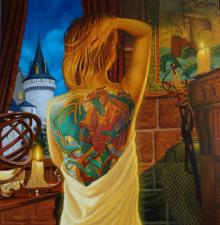 Golden Fool
Golden Fool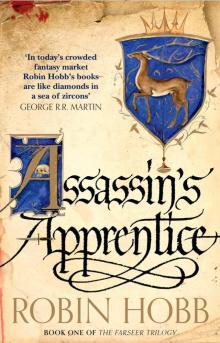 Assassins Apprentice
Assassins Apprentice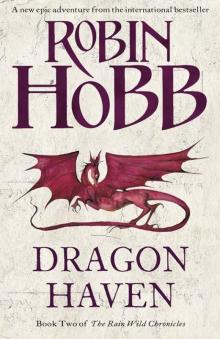 The Dragon Keeper
The Dragon Keeper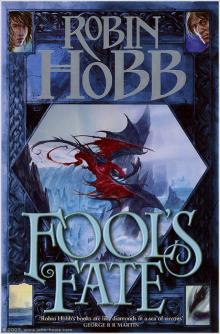 Fools Fate
Fools Fate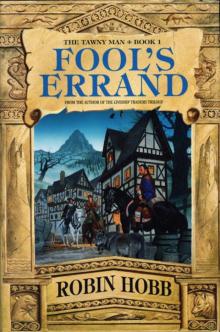 Fools Errand
Fools Errand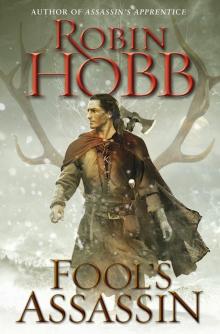 Fools Assassin
Fools Assassin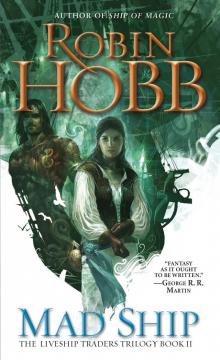 The Mad Ship
The Mad Ship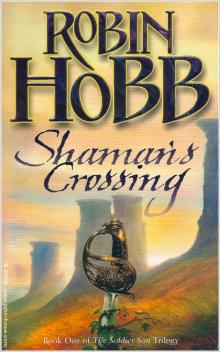 Shamans Crossing
Shamans Crossing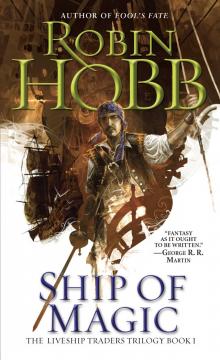 Ship of Magic
Ship of Magic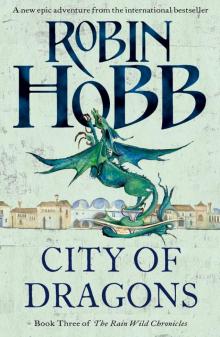 City of Dragons
City of Dragons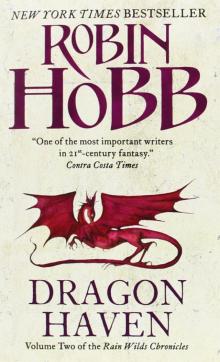 Dragon Haven
Dragon Haven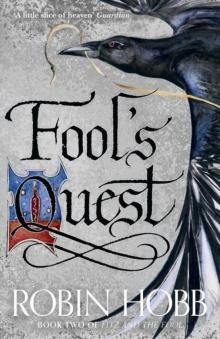 Fools Quest
Fools Quest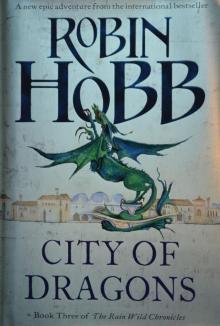 Blood of Dragons
Blood of Dragons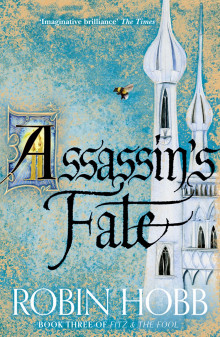 Assassin's Fate
Assassin's Fate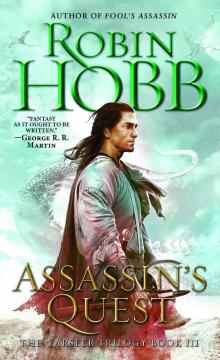 Assassins Quest
Assassins Quest Renegades Magic
Renegades Magic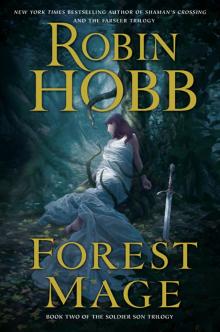 Forest Mage
Forest Mage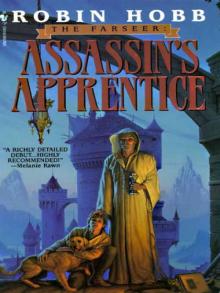 Assassin's Apprentice tft-1
Assassin's Apprentice tft-1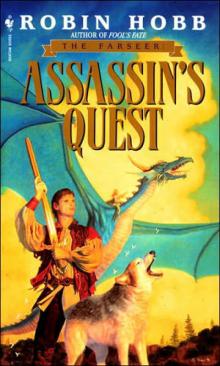 Assassin's Quest tft-3
Assassin's Quest tft-3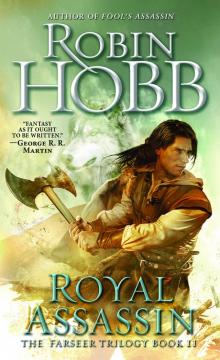 Royal Assassin
Royal Assassin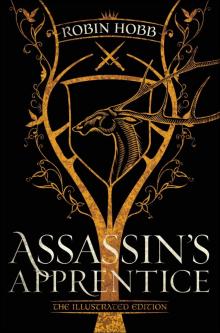 Assassin's Apprentice (The Illustrated Edition)
Assassin's Apprentice (The Illustrated Edition)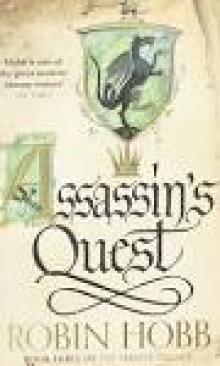 Assassin's Quest (UK)
Assassin's Quest (UK) Royal Assassin (UK)
Royal Assassin (UK)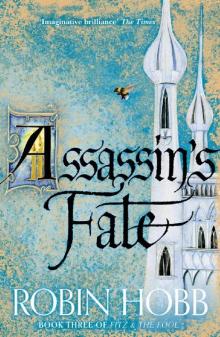 FF3 Assassin’s Fate
FF3 Assassin’s Fate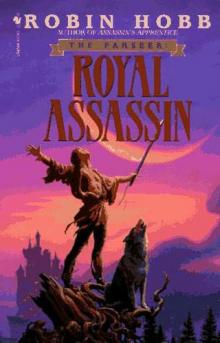 Royal Assassin tft-2
Royal Assassin tft-2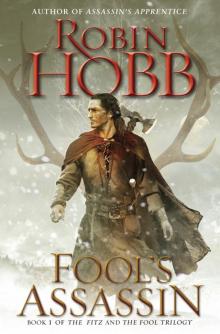 Fool’s Assassin: Book One of the Fitz and the Fool Trilogy
Fool’s Assassin: Book One of the Fitz and the Fool Trilogy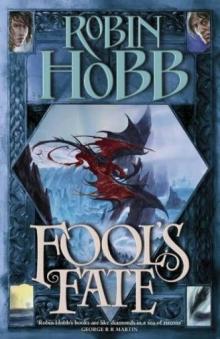 Fool's Fate ttm-3
Fool's Fate ttm-3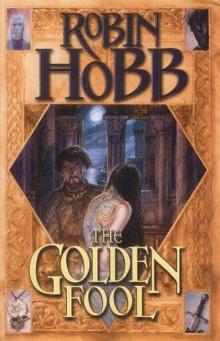 The Golden Fool ttm-2
The Golden Fool ttm-2 The Liveship Traders Series
The Liveship Traders Series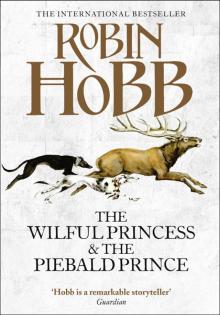 The Wilful Princess and the Piebald Prince
The Wilful Princess and the Piebald Prince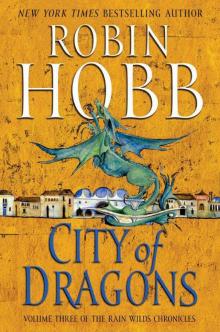 City of Dragons rwc-3
City of Dragons rwc-3 The Tawny Man 1 - Fool's Errand
The Tawny Man 1 - Fool's Errand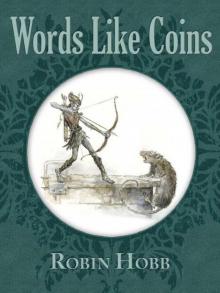 Words Like Coins
Words Like Coins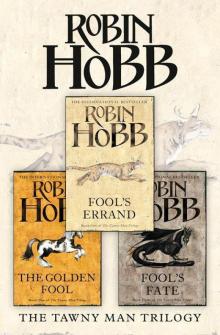 The Complete Tawny Man Trilogy Omnibus
The Complete Tawny Man Trilogy Omnibus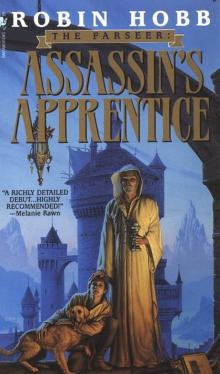 Farseer 1 - Assassin's Apprentice
Farseer 1 - Assassin's Apprentice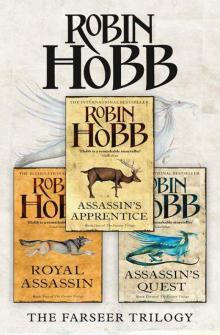 The Complete Farseer Trilogy Omnibus
The Complete Farseer Trilogy Omnibus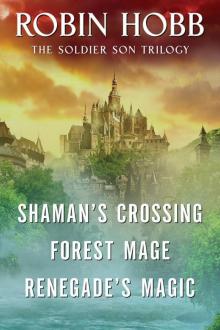 The Soldier Son Trilogy Bundle
The Soldier Son Trilogy Bundle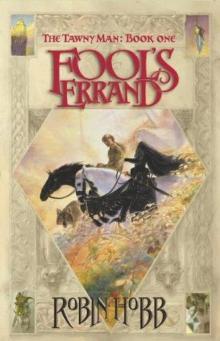 Fool's Errand ttm-1
Fool's Errand ttm-1 Blue Boots
Blue Boots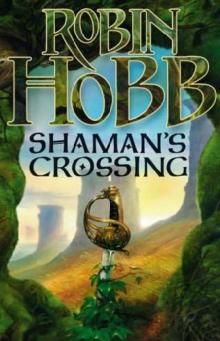 Shaman's Crossing ss-1
Shaman's Crossing ss-1 Mad Ship
Mad Ship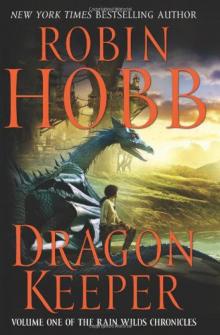 Dragon Keeper
Dragon Keeper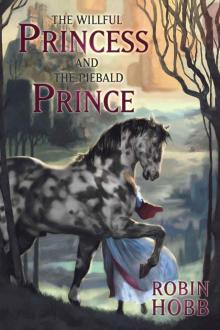 The Willful Princess and the Piebald Prince
The Willful Princess and the Piebald Prince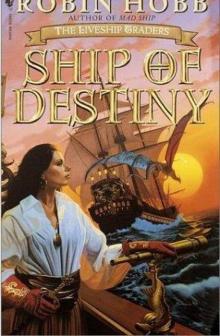 Ship of Destiny tlt-3
Ship of Destiny tlt-3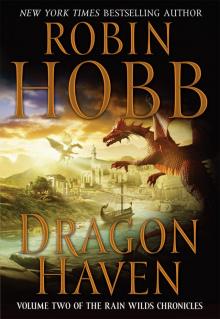 Rain Wild Chronicles 02 - Dragon Haven
Rain Wild Chronicles 02 - Dragon Haven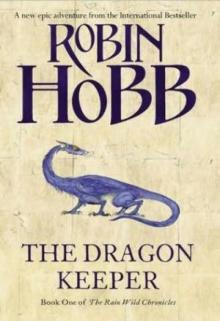 The Dragon Keeper trwc-1
The Dragon Keeper trwc-1 The Triumph
The Triumph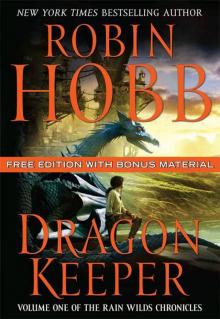 Dragon Keeper Free Edition with Bonus Material
Dragon Keeper Free Edition with Bonus Material Mad Ship tlt-2
Mad Ship tlt-2 The Inheritance and Other Stories
The Inheritance and Other Stories Tawny Man 02 - Golden Fool
Tawny Man 02 - Golden Fool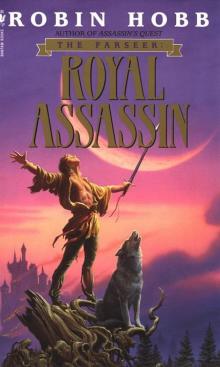 Farseer 2 - Royal Assassin
Farseer 2 - Royal Assassin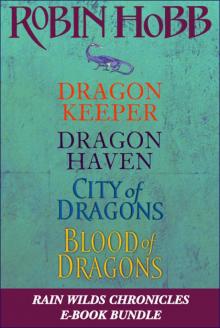 Rain Wilds Chronicles
Rain Wilds Chronicles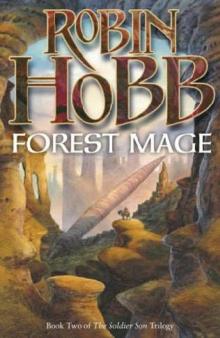 Forest Mage ss-2
Forest Mage ss-2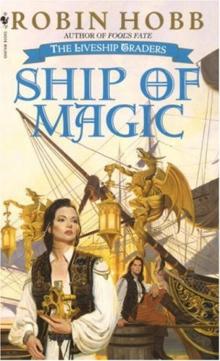 Ship of Magic lt-1
Ship of Magic lt-1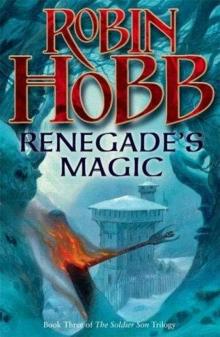 Renegade's Magic ss-3
Renegade's Magic ss-3